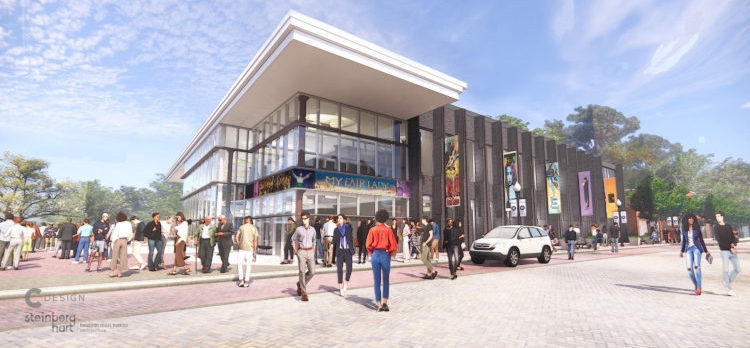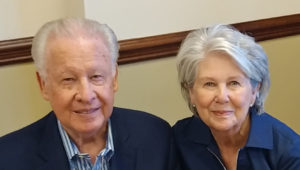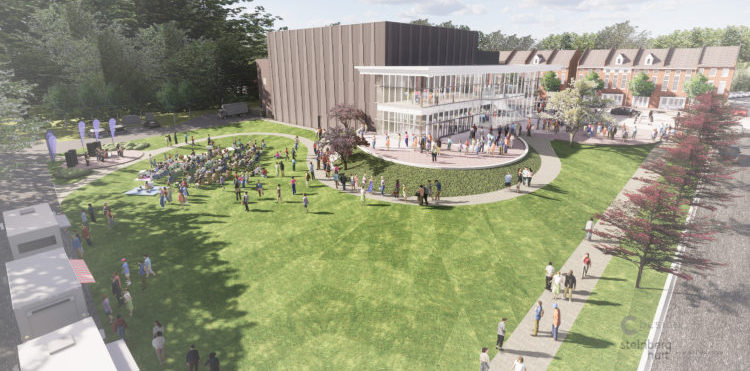
Construction on the Cain Center for the Arts is expected to begin in June of 2021
Sept. 1. By Dave Vieser. The dream of an arts/cultural center which began almost 20 years ago take a dramatic step closer to reality this month when the old blue warehouse buildings next to the Cornelius Police Station are torn down. Construction crews will “raze Cain” on Sept. 10 according to Mayor Woody Washam.
The Cain Center for the Arts will be a $25 million regional arts venue, as well as an economic development engine in downtown Cornelius.
“This has been long time coming,” Washam said at a town board meeting, “It will, in fact, have to be done in stages that day in order to comply with the state COVID regulations.”

Bill and Ericka Cain
The Cain Center for the Arts should open in 2022, all 32,000 square feet of it. For comparison, it’s more than six times larger than the Cook House restaurant. The Publix store in Cornelius is 50,000 square feet. It will include a 400-seat theater, an art gallery, classrooms and an outdoor plaza.
Technically, the start of the arts center project dates back to 2013 according to Town Manager Andrew Grant. That was the year Cornelius voters approved a $4 million Town Center Redevelopment Bond referendum. The bond language stated that the funds were to be spent on a redevelopment project for primarily the Town Center, or downtown, area of Cornelius.
After the referendum, a citizen-led working group determined that a non-profit arts/community center would provide many benefits to Cornelius, including arts classes and programming—a place for the community. In addition to providing a home for national and regional shows and performances, it will also be a venue for community, private and civic events.
At one point, around 2017, there was consideration of using ceramics as the “Nutcracker” for the center, such that the town would have a highly recognizable people’s brand and mission. Eventually that morphed into a widerscoped center with a greater emphasis on performance art.
Finance and generosity
The Town of Cornelius has earmarked $4 million from the 2013 Redevelopment Bonds for the project, in addition to spending $1.5 million to purchase the property where the center will be built.
The center is named for Ericka and Bill Cain, founders and owners of Financial Independence Group. They made the seminal $5 million gift to the cause in 2018.
Significant donors include $2 million from Cornelius resident Kathryn Keele and $500,000 from the Cashion family—their name will be on the entryway and Public Art Corner—as well as $1 million from Mecklenburg County.
Public fundraising, which is getting under way now, includes a campaign where individuals and families can purchase bricks engraved with their name which will become a permanent fixture at the outdoor plaza. The bricks can be purchased in three sizes $250, $500 and the largest, at $1,000.
Town funding for the project through the current fiscal year has come in several categories:
• About $930,000 has been spent on the initial designs.
• $25,000 was used to support planning and study efforts.
The 2021 town budget includes $289,000 for salaries and operating expenses.
Regional impact
Apart from Davidson College, there are no sizable venues for the performing arts in Lake Norman. The Cain Center for the Arts will have a regional impact on the arts, performers and young people, Mayor Washam said.
He said the public/private project will not only anchor Old Town Cornelius but the entire Lake Norman Region by adding a “critically missing regional element which will provide cultural arts, arts education and a community center for citizens of Cornelius, North Mecklenburg and beyond.”
Governance
The Center has a 16-member board which oversees the development in conjunction with the town. Two town board members, Jim Duke and Denis Bilodeau, served on the board, but Duke stepped down in July to avoid conflict of interest in his role as a member of the Board of Commissioners.
Other board members include Greg Wessling, president; Pat Bechdol, vice president, Troy Stafford, treasurer; Cynthia Bush, secretary; Jean Bock; Steve Brumm; Joshua Dobi; Kate Gaither; Ginger Grifffin; Donna Johnson; Bill Morgan; Caroline Mullan; Paul Newton; Bill Ward; and Mayor Washam.
Justin Dionne is the executive director of Cain Center for the Arts. The Salisbury native graduated from Catawba College and went on to build the Norvell Theater and then spearheaded efforts to renovate a 1920’s warehouse in Salisbury which became the popular Lee Street Theater.
The goal of the center is to create a place where all of the residents of the Lake Norman Region “can come to enjoy time together and experience a sense of community and culture,” Dionne said.
“The type of experiences that will happen here will shape lives for generations—from outdoor festivals to concerts, classes, and more,” he said.
Downtown anchor
Final plans for the center were released in May. They show a contemporary gathering place with stage presence.
Commercial real estate broker Robbie Lowrance said the Cain Center for the Arts will have “an added economic impact on the ever-changing” downtown area.
“It will be very important to plan ahead for traffic and parking issues,” he said. Officials believe parking nearby is sufficient to support events at the center. One plus for downtown retail: Pedestrian traffic between parking and performances.
Meanwhile, there is discussion about a restaurant and office project at the corner of Catawba and North Main as well as a mixed-use project on 1.4 acres of land just west of the arts center property with 150 feet of combined frontage along Catawba Avenue and roughly 240 feet on Meridian Street.
Dionne said he takes seriously “our responsibility of being an anchor” for what will become the Old Town Cornelius Arts District.
“We are committed to continuing to work with local businesses…to enhance and grow the artistic ecosystem of downtown,” he said.

Aerial view of the Cain Center
Cain Center Costs
• Building Construction: $18,400,000
• Equipment & Furnishings: $2,500,000
• Professional Services: $2,000,000
• Administrative Costs: $600,000
• Land Purchase: $1,500,000




